Causes of Anxiety - Understanding the Factors that Contribute to Anxiety Disorders
VerifiedAdded on 2023/06/10
|8
|1968
|220
AI Summary
This article discusses the different factors that contribute to anxiety disorders, including genetics, biology, medical factors, environmental causes, lifestyle habits, and more. It also explores the impact of changes, traumas, upbringing, and other experiences on anxiety. The article emphasizes the importance of understanding the causes of anxiety to effectively treat patients.
Contribute Materials
Your contribution can guide someone’s learning journey. Share your
documents today.
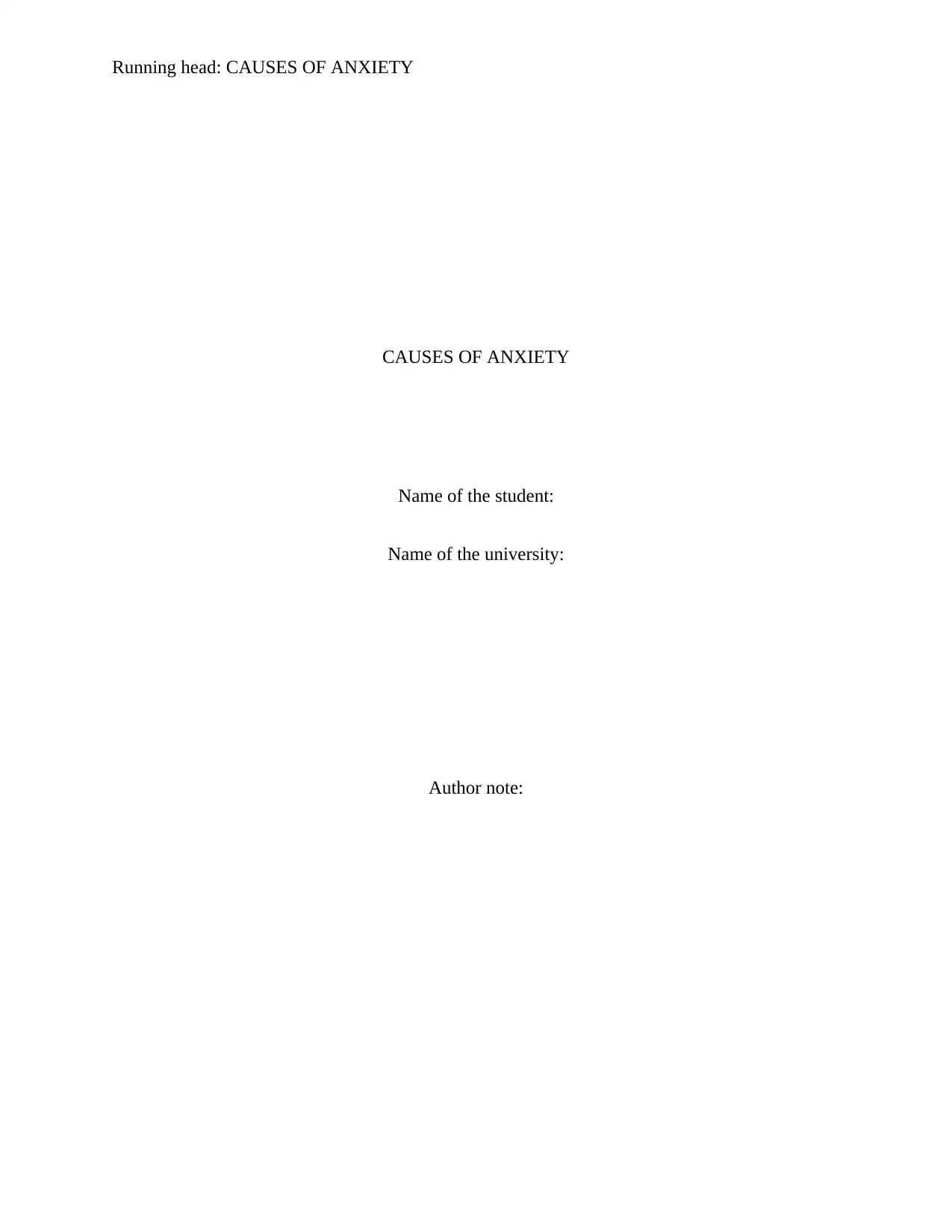
Running head: CAUSES OF ANXIETY
CAUSES OF ANXIETY
Name of the student:
Name of the university:
Author note:
CAUSES OF ANXIETY
Name of the student:
Name of the university:
Author note:
Secure Best Marks with AI Grader
Need help grading? Try our AI Grader for instant feedback on your assignments.
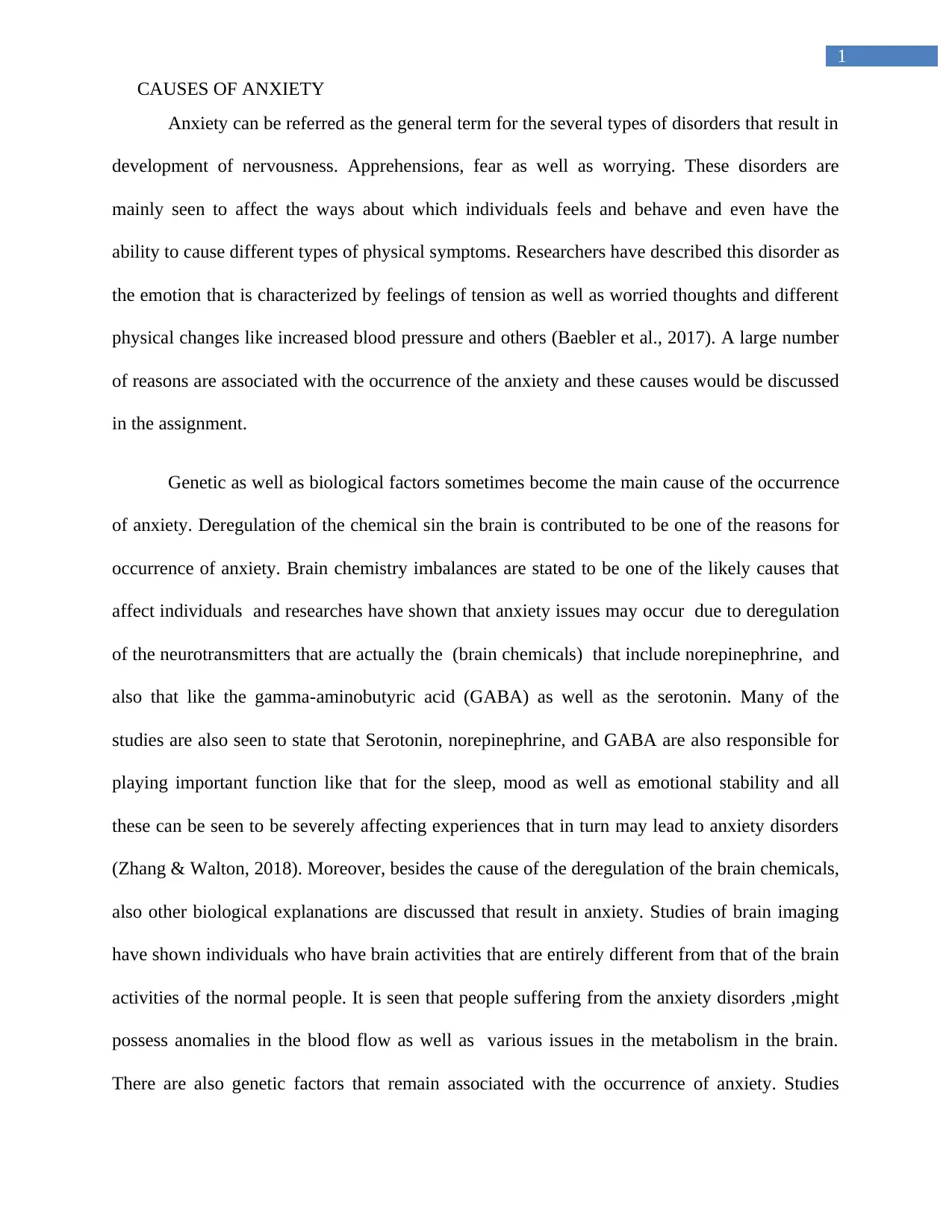
1
CAUSES OF ANXIETY
Anxiety can be referred as the general term for the several types of disorders that result in
development of nervousness. Apprehensions, fear as well as worrying. These disorders are
mainly seen to affect the ways about which individuals feels and behave and even have the
ability to cause different types of physical symptoms. Researchers have described this disorder as
the emotion that is characterized by feelings of tension as well as worried thoughts and different
physical changes like increased blood pressure and others (Baebler et al., 2017). A large number
of reasons are associated with the occurrence of the anxiety and these causes would be discussed
in the assignment.
Genetic as well as biological factors sometimes become the main cause of the occurrence
of anxiety. Deregulation of the chemical sin the brain is contributed to be one of the reasons for
occurrence of anxiety. Brain chemistry imbalances are stated to be one of the likely causes that
affect individuals and researches have shown that anxiety issues may occur due to deregulation
of the neurotransmitters that are actually the (brain chemicals) that include norepinephrine, and
also that like the gamma-aminobutyric acid (GABA) as well as the serotonin. Many of the
studies are also seen to state that Serotonin, norepinephrine, and GABA are also responsible for
playing important function like that for the sleep, mood as well as emotional stability and all
these can be seen to be severely affecting experiences that in turn may lead to anxiety disorders
(Zhang & Walton, 2018). Moreover, besides the cause of the deregulation of the brain chemicals,
also other biological explanations are discussed that result in anxiety. Studies of brain imaging
have shown individuals who have brain activities that are entirely different from that of the brain
activities of the normal people. It is seen that people suffering from the anxiety disorders ,might
possess anomalies in the blood flow as well as various issues in the metabolism in the brain.
There are also genetic factors that remain associated with the occurrence of anxiety. Studies
CAUSES OF ANXIETY
Anxiety can be referred as the general term for the several types of disorders that result in
development of nervousness. Apprehensions, fear as well as worrying. These disorders are
mainly seen to affect the ways about which individuals feels and behave and even have the
ability to cause different types of physical symptoms. Researchers have described this disorder as
the emotion that is characterized by feelings of tension as well as worried thoughts and different
physical changes like increased blood pressure and others (Baebler et al., 2017). A large number
of reasons are associated with the occurrence of the anxiety and these causes would be discussed
in the assignment.
Genetic as well as biological factors sometimes become the main cause of the occurrence
of anxiety. Deregulation of the chemical sin the brain is contributed to be one of the reasons for
occurrence of anxiety. Brain chemistry imbalances are stated to be one of the likely causes that
affect individuals and researches have shown that anxiety issues may occur due to deregulation
of the neurotransmitters that are actually the (brain chemicals) that include norepinephrine, and
also that like the gamma-aminobutyric acid (GABA) as well as the serotonin. Many of the
studies are also seen to state that Serotonin, norepinephrine, and GABA are also responsible for
playing important function like that for the sleep, mood as well as emotional stability and all
these can be seen to be severely affecting experiences that in turn may lead to anxiety disorders
(Zhang & Walton, 2018). Moreover, besides the cause of the deregulation of the brain chemicals,
also other biological explanations are discussed that result in anxiety. Studies of brain imaging
have shown individuals who have brain activities that are entirely different from that of the brain
activities of the normal people. It is seen that people suffering from the anxiety disorders ,might
possess anomalies in the blood flow as well as various issues in the metabolism in the brain.
There are also genetic factors that remain associated with the occurrence of anxiety. Studies
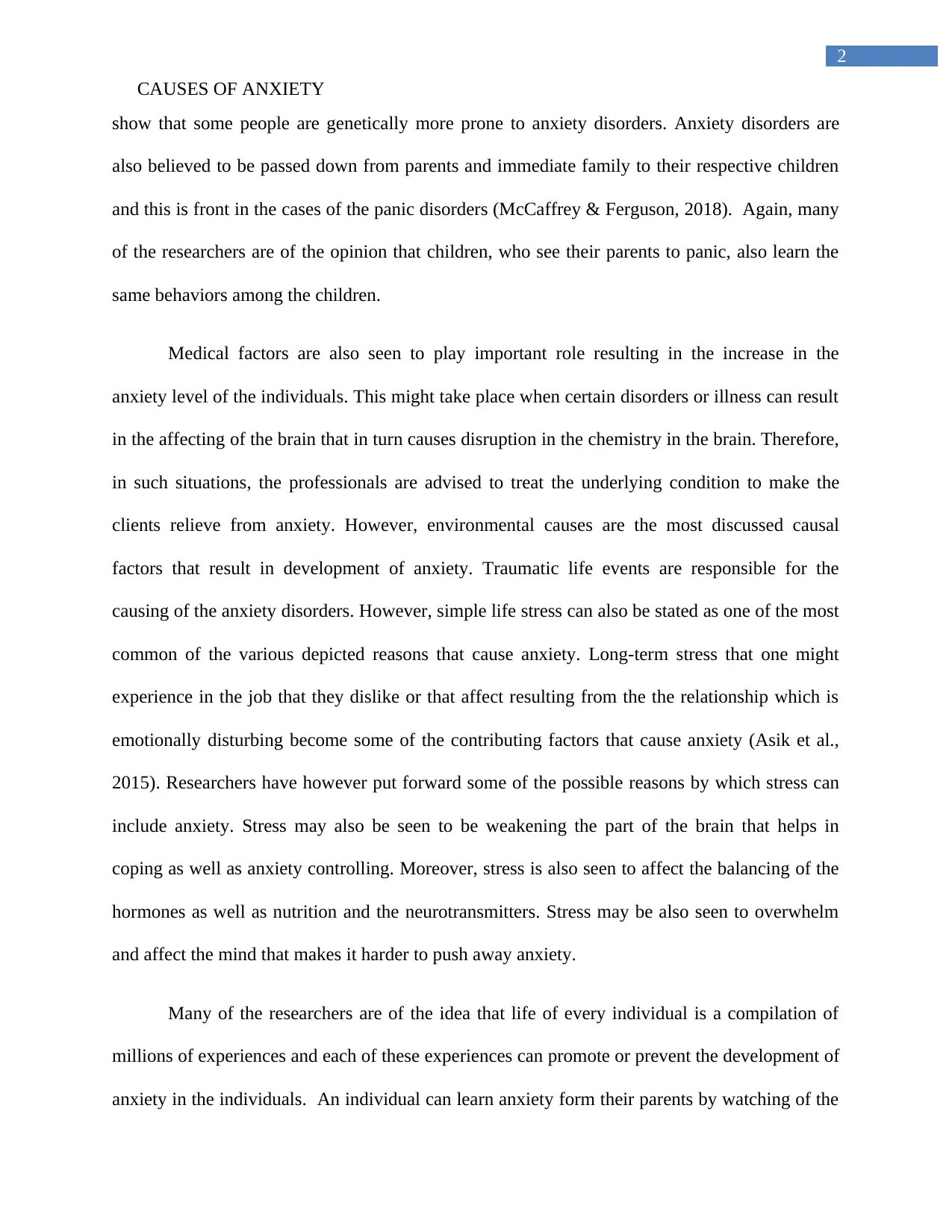
2
CAUSES OF ANXIETY
show that some people are genetically more prone to anxiety disorders. Anxiety disorders are
also believed to be passed down from parents and immediate family to their respective children
and this is front in the cases of the panic disorders (McCaffrey & Ferguson, 2018). Again, many
of the researchers are of the opinion that children, who see their parents to panic, also learn the
same behaviors among the children.
Medical factors are also seen to play important role resulting in the increase in the
anxiety level of the individuals. This might take place when certain disorders or illness can result
in the affecting of the brain that in turn causes disruption in the chemistry in the brain. Therefore,
in such situations, the professionals are advised to treat the underlying condition to make the
clients relieve from anxiety. However, environmental causes are the most discussed causal
factors that result in development of anxiety. Traumatic life events are responsible for the
causing of the anxiety disorders. However, simple life stress can also be stated as one of the most
common of the various depicted reasons that cause anxiety. Long-term stress that one might
experience in the job that they dislike or that affect resulting from the the relationship which is
emotionally disturbing become some of the contributing factors that cause anxiety (Asik et al.,
2015). Researchers have however put forward some of the possible reasons by which stress can
include anxiety. Stress may also be seen to be weakening the part of the brain that helps in
coping as well as anxiety controlling. Moreover, stress is also seen to affect the balancing of the
hormones as well as nutrition and the neurotransmitters. Stress may be also seen to overwhelm
and affect the mind that makes it harder to push away anxiety.
Many of the researchers are of the idea that life of every individual is a compilation of
millions of experiences and each of these experiences can promote or prevent the development of
anxiety in the individuals. An individual can learn anxiety form their parents by watching of the
CAUSES OF ANXIETY
show that some people are genetically more prone to anxiety disorders. Anxiety disorders are
also believed to be passed down from parents and immediate family to their respective children
and this is front in the cases of the panic disorders (McCaffrey & Ferguson, 2018). Again, many
of the researchers are of the opinion that children, who see their parents to panic, also learn the
same behaviors among the children.
Medical factors are also seen to play important role resulting in the increase in the
anxiety level of the individuals. This might take place when certain disorders or illness can result
in the affecting of the brain that in turn causes disruption in the chemistry in the brain. Therefore,
in such situations, the professionals are advised to treat the underlying condition to make the
clients relieve from anxiety. However, environmental causes are the most discussed causal
factors that result in development of anxiety. Traumatic life events are responsible for the
causing of the anxiety disorders. However, simple life stress can also be stated as one of the most
common of the various depicted reasons that cause anxiety. Long-term stress that one might
experience in the job that they dislike or that affect resulting from the the relationship which is
emotionally disturbing become some of the contributing factors that cause anxiety (Asik et al.,
2015). Researchers have however put forward some of the possible reasons by which stress can
include anxiety. Stress may also be seen to be weakening the part of the brain that helps in
coping as well as anxiety controlling. Moreover, stress is also seen to affect the balancing of the
hormones as well as nutrition and the neurotransmitters. Stress may be also seen to overwhelm
and affect the mind that makes it harder to push away anxiety.
Many of the researchers are of the idea that life of every individual is a compilation of
millions of experiences and each of these experiences can promote or prevent the development of
anxiety in the individuals. An individual can learn anxiety form their parents by watching of the
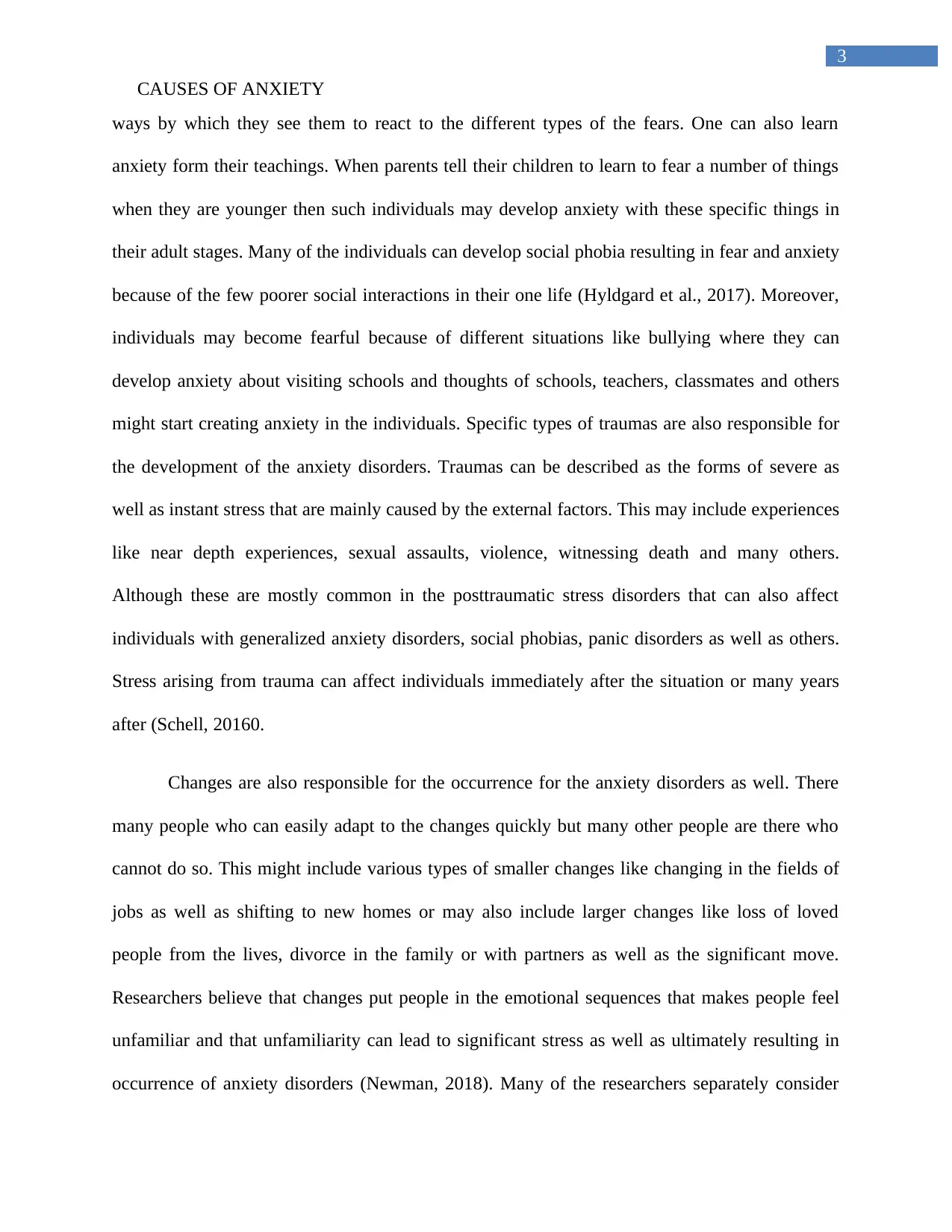
3
CAUSES OF ANXIETY
ways by which they see them to react to the different types of the fears. One can also learn
anxiety form their teachings. When parents tell their children to learn to fear a number of things
when they are younger then such individuals may develop anxiety with these specific things in
their adult stages. Many of the individuals can develop social phobia resulting in fear and anxiety
because of the few poorer social interactions in their one life (Hyldgard et al., 2017). Moreover,
individuals may become fearful because of different situations like bullying where they can
develop anxiety about visiting schools and thoughts of schools, teachers, classmates and others
might start creating anxiety in the individuals. Specific types of traumas are also responsible for
the development of the anxiety disorders. Traumas can be described as the forms of severe as
well as instant stress that are mainly caused by the external factors. This may include experiences
like near depth experiences, sexual assaults, violence, witnessing death and many others.
Although these are mostly common in the posttraumatic stress disorders that can also affect
individuals with generalized anxiety disorders, social phobias, panic disorders as well as others.
Stress arising from trauma can affect individuals immediately after the situation or many years
after (Schell, 20160.
Changes are also responsible for the occurrence for the anxiety disorders as well. There
many people who can easily adapt to the changes quickly but many other people are there who
cannot do so. This might include various types of smaller changes like changing in the fields of
jobs as well as shifting to new homes or may also include larger changes like loss of loved
people from the lives, divorce in the family or with partners as well as the significant move.
Researchers believe that changes put people in the emotional sequences that makes people feel
unfamiliar and that unfamiliarity can lead to significant stress as well as ultimately resulting in
occurrence of anxiety disorders (Newman, 2018). Many of the researchers separately consider
CAUSES OF ANXIETY
ways by which they see them to react to the different types of the fears. One can also learn
anxiety form their teachings. When parents tell their children to learn to fear a number of things
when they are younger then such individuals may develop anxiety with these specific things in
their adult stages. Many of the individuals can develop social phobia resulting in fear and anxiety
because of the few poorer social interactions in their one life (Hyldgard et al., 2017). Moreover,
individuals may become fearful because of different situations like bullying where they can
develop anxiety about visiting schools and thoughts of schools, teachers, classmates and others
might start creating anxiety in the individuals. Specific types of traumas are also responsible for
the development of the anxiety disorders. Traumas can be described as the forms of severe as
well as instant stress that are mainly caused by the external factors. This may include experiences
like near depth experiences, sexual assaults, violence, witnessing death and many others.
Although these are mostly common in the posttraumatic stress disorders that can also affect
individuals with generalized anxiety disorders, social phobias, panic disorders as well as others.
Stress arising from trauma can affect individuals immediately after the situation or many years
after (Schell, 20160.
Changes are also responsible for the occurrence for the anxiety disorders as well. There
many people who can easily adapt to the changes quickly but many other people are there who
cannot do so. This might include various types of smaller changes like changing in the fields of
jobs as well as shifting to new homes or may also include larger changes like loss of loved
people from the lives, divorce in the family or with partners as well as the significant move.
Researchers believe that changes put people in the emotional sequences that makes people feel
unfamiliar and that unfamiliarity can lead to significant stress as well as ultimately resulting in
occurrence of anxiety disorders (Newman, 2018). Many of the researchers separately consider
Secure Best Marks with AI Grader
Need help grading? Try our AI Grader for instant feedback on your assignments.
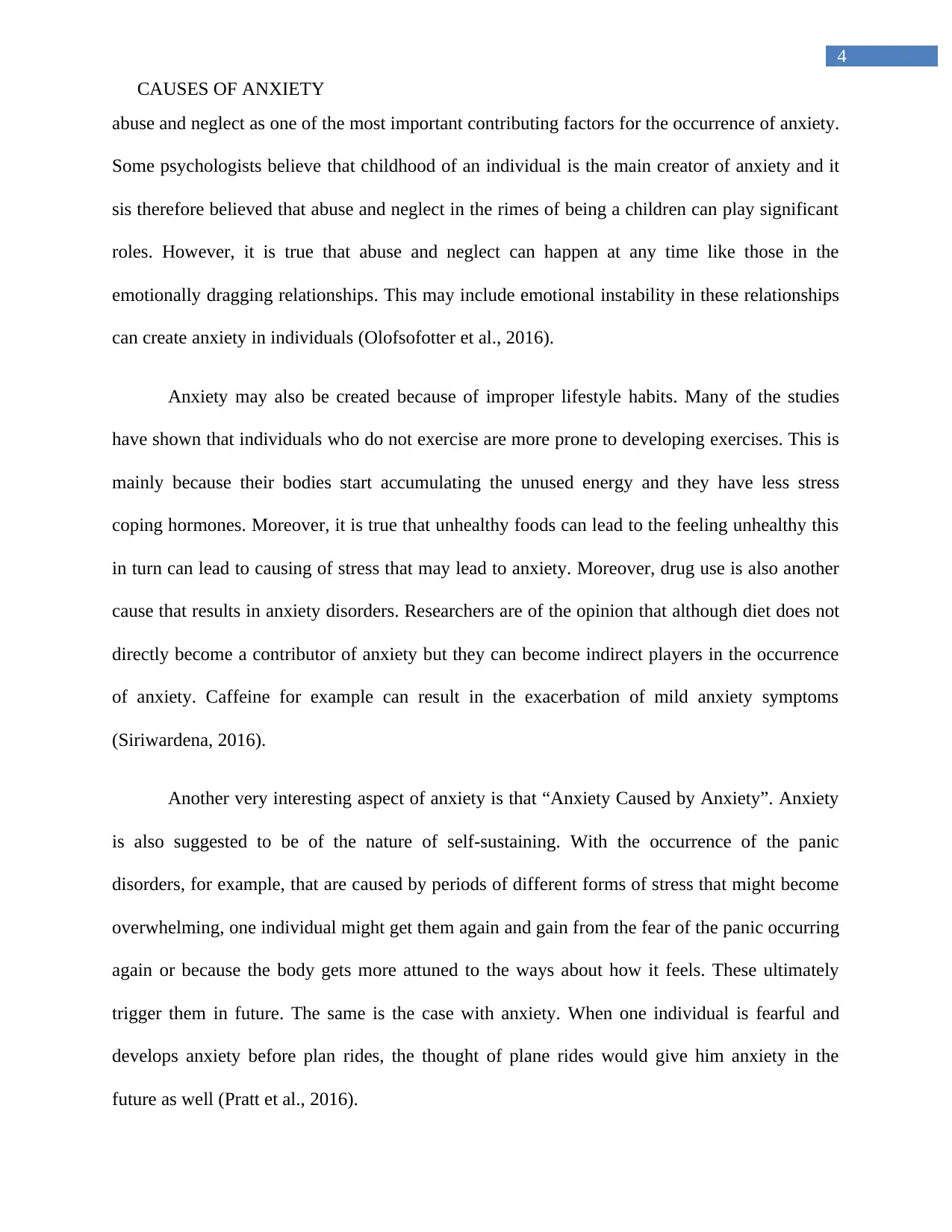
4
CAUSES OF ANXIETY
abuse and neglect as one of the most important contributing factors for the occurrence of anxiety.
Some psychologists believe that childhood of an individual is the main creator of anxiety and it
sis therefore believed that abuse and neglect in the rimes of being a children can play significant
roles. However, it is true that abuse and neglect can happen at any time like those in the
emotionally dragging relationships. This may include emotional instability in these relationships
can create anxiety in individuals (Olofsofotter et al., 2016).
Anxiety may also be created because of improper lifestyle habits. Many of the studies
have shown that individuals who do not exercise are more prone to developing exercises. This is
mainly because their bodies start accumulating the unused energy and they have less stress
coping hormones. Moreover, it is true that unhealthy foods can lead to the feeling unhealthy this
in turn can lead to causing of stress that may lead to anxiety. Moreover, drug use is also another
cause that results in anxiety disorders. Researchers are of the opinion that although diet does not
directly become a contributor of anxiety but they can become indirect players in the occurrence
of anxiety. Caffeine for example can result in the exacerbation of mild anxiety symptoms
(Siriwardena, 2016).
Another very interesting aspect of anxiety is that “Anxiety Caused by Anxiety”. Anxiety
is also suggested to be of the nature of self-sustaining. With the occurrence of the panic
disorders, for example, that are caused by periods of different forms of stress that might become
overwhelming, one individual might get them again and gain from the fear of the panic occurring
again or because the body gets more attuned to the ways about how it feels. These ultimately
trigger them in future. The same is the case with anxiety. When one individual is fearful and
develops anxiety before plan rides, the thought of plane rides would give him anxiety in the
future as well (Pratt et al., 2016).
CAUSES OF ANXIETY
abuse and neglect as one of the most important contributing factors for the occurrence of anxiety.
Some psychologists believe that childhood of an individual is the main creator of anxiety and it
sis therefore believed that abuse and neglect in the rimes of being a children can play significant
roles. However, it is true that abuse and neglect can happen at any time like those in the
emotionally dragging relationships. This may include emotional instability in these relationships
can create anxiety in individuals (Olofsofotter et al., 2016).
Anxiety may also be created because of improper lifestyle habits. Many of the studies
have shown that individuals who do not exercise are more prone to developing exercises. This is
mainly because their bodies start accumulating the unused energy and they have less stress
coping hormones. Moreover, it is true that unhealthy foods can lead to the feeling unhealthy this
in turn can lead to causing of stress that may lead to anxiety. Moreover, drug use is also another
cause that results in anxiety disorders. Researchers are of the opinion that although diet does not
directly become a contributor of anxiety but they can become indirect players in the occurrence
of anxiety. Caffeine for example can result in the exacerbation of mild anxiety symptoms
(Siriwardena, 2016).
Another very interesting aspect of anxiety is that “Anxiety Caused by Anxiety”. Anxiety
is also suggested to be of the nature of self-sustaining. With the occurrence of the panic
disorders, for example, that are caused by periods of different forms of stress that might become
overwhelming, one individual might get them again and gain from the fear of the panic occurring
again or because the body gets more attuned to the ways about how it feels. These ultimately
trigger them in future. The same is the case with anxiety. When one individual is fearful and
develops anxiety before plan rides, the thought of plane rides would give him anxiety in the
future as well (Pratt et al., 2016).

5
CAUSES OF ANXIETY
Therefore, from this explanation, it becomes clear that individuals might have brain
chemicals deregulation as well as anomalies or genetic factors that might cause anxiety. Changes
in life, traumas, upbringing and many others may also result in anxiety. Professionals should
understand the causes and treat patients accordingly.
CAUSES OF ANXIETY
Therefore, from this explanation, it becomes clear that individuals might have brain
chemicals deregulation as well as anomalies or genetic factors that might cause anxiety. Changes
in life, traumas, upbringing and many others may also result in anxiety. Professionals should
understand the causes and treat patients accordingly.
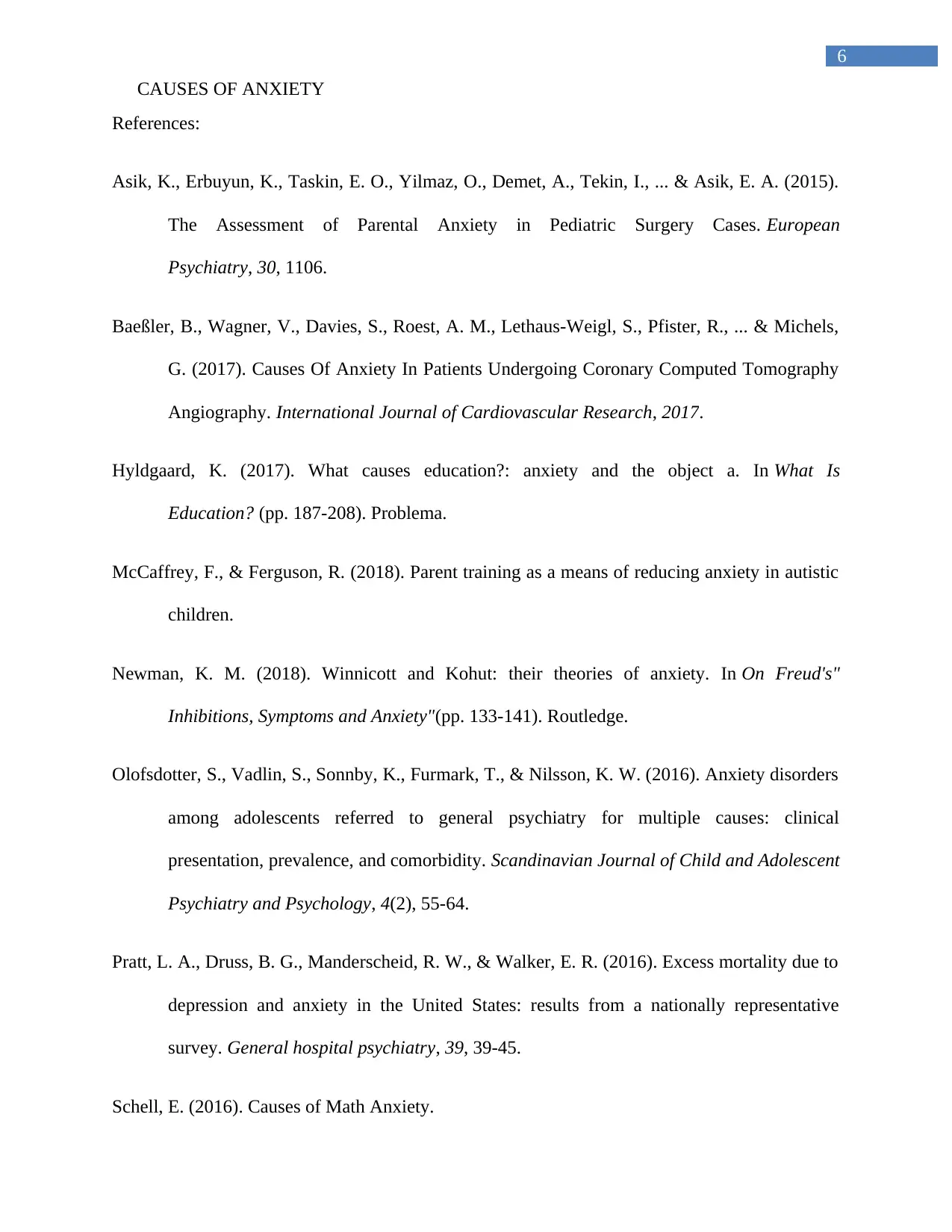
6
CAUSES OF ANXIETY
References:
Asik, K., Erbuyun, K., Taskin, E. O., Yilmaz, O., Demet, A., Tekin, I., ... & Asik, E. A. (2015).
The Assessment of Parental Anxiety in Pediatric Surgery Cases. European
Psychiatry, 30, 1106.
Baeßler, B., Wagner, V., Davies, S., Roest, A. M., Lethaus-Weigl, S., Pfister, R., ... & Michels,
G. (2017). Causes Of Anxiety In Patients Undergoing Coronary Computed Tomography
Angiography. International Journal of Cardiovascular Research, 2017.
Hyldgaard, K. (2017). What causes education?: anxiety and the object a. In What Is
Education? (pp. 187-208). Problema.
McCaffrey, F., & Ferguson, R. (2018). Parent training as a means of reducing anxiety in autistic
children.
Newman, K. M. (2018). Winnicott and Kohut: their theories of anxiety. In On Freud's"
Inhibitions, Symptoms and Anxiety"(pp. 133-141). Routledge.
Olofsdotter, S., Vadlin, S., Sonnby, K., Furmark, T., & Nilsson, K. W. (2016). Anxiety disorders
among adolescents referred to general psychiatry for multiple causes: clinical
presentation, prevalence, and comorbidity. Scandinavian Journal of Child and Adolescent
Psychiatry and Psychology, 4(2), 55-64.
Pratt, L. A., Druss, B. G., Manderscheid, R. W., & Walker, E. R. (2016). Excess mortality due to
depression and anxiety in the United States: results from a nationally representative
survey. General hospital psychiatry, 39, 39-45.
Schell, E. (2016). Causes of Math Anxiety.
CAUSES OF ANXIETY
References:
Asik, K., Erbuyun, K., Taskin, E. O., Yilmaz, O., Demet, A., Tekin, I., ... & Asik, E. A. (2015).
The Assessment of Parental Anxiety in Pediatric Surgery Cases. European
Psychiatry, 30, 1106.
Baeßler, B., Wagner, V., Davies, S., Roest, A. M., Lethaus-Weigl, S., Pfister, R., ... & Michels,
G. (2017). Causes Of Anxiety In Patients Undergoing Coronary Computed Tomography
Angiography. International Journal of Cardiovascular Research, 2017.
Hyldgaard, K. (2017). What causes education?: anxiety and the object a. In What Is
Education? (pp. 187-208). Problema.
McCaffrey, F., & Ferguson, R. (2018). Parent training as a means of reducing anxiety in autistic
children.
Newman, K. M. (2018). Winnicott and Kohut: their theories of anxiety. In On Freud's"
Inhibitions, Symptoms and Anxiety"(pp. 133-141). Routledge.
Olofsdotter, S., Vadlin, S., Sonnby, K., Furmark, T., & Nilsson, K. W. (2016). Anxiety disorders
among adolescents referred to general psychiatry for multiple causes: clinical
presentation, prevalence, and comorbidity. Scandinavian Journal of Child and Adolescent
Psychiatry and Psychology, 4(2), 55-64.
Pratt, L. A., Druss, B. G., Manderscheid, R. W., & Walker, E. R. (2016). Excess mortality due to
depression and anxiety in the United States: results from a nationally representative
survey. General hospital psychiatry, 39, 39-45.
Schell, E. (2016). Causes of Math Anxiety.
Paraphrase This Document
Need a fresh take? Get an instant paraphrase of this document with our AI Paraphraser
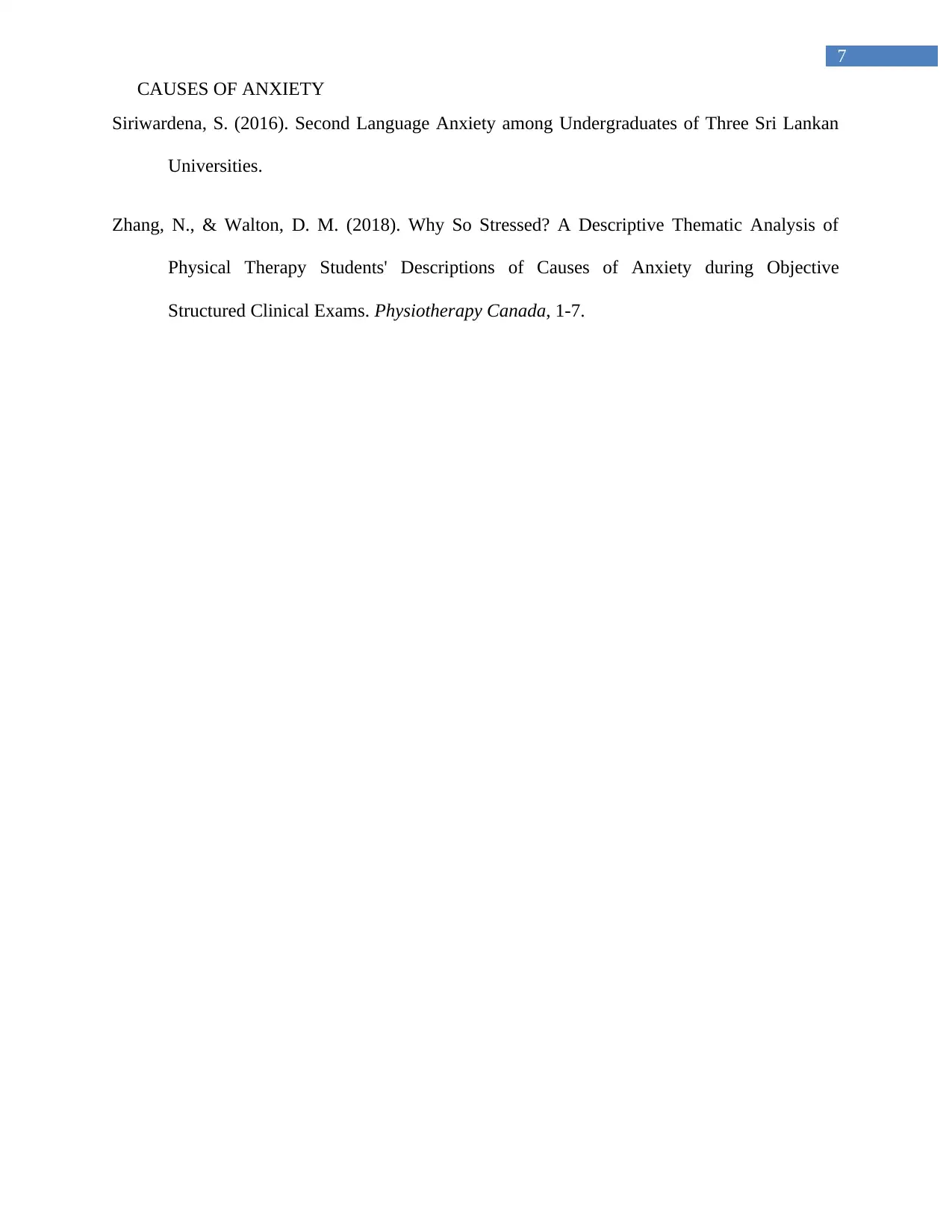
7
CAUSES OF ANXIETY
Siriwardena, S. (2016). Second Language Anxiety among Undergraduates of Three Sri Lankan
Universities.
Zhang, N., & Walton, D. M. (2018). Why So Stressed? A Descriptive Thematic Analysis of
Physical Therapy Students' Descriptions of Causes of Anxiety during Objective
Structured Clinical Exams. Physiotherapy Canada, 1-7.
CAUSES OF ANXIETY
Siriwardena, S. (2016). Second Language Anxiety among Undergraduates of Three Sri Lankan
Universities.
Zhang, N., & Walton, D. M. (2018). Why So Stressed? A Descriptive Thematic Analysis of
Physical Therapy Students' Descriptions of Causes of Anxiety during Objective
Structured Clinical Exams. Physiotherapy Canada, 1-7.
1 out of 8
Related Documents
Your All-in-One AI-Powered Toolkit for Academic Success.
+13062052269
info@desklib.com
Available 24*7 on WhatsApp / Email
![[object Object]](/_next/static/media/star-bottom.7253800d.svg)
Unlock your academic potential
© 2024 | Zucol Services PVT LTD | All rights reserved.





